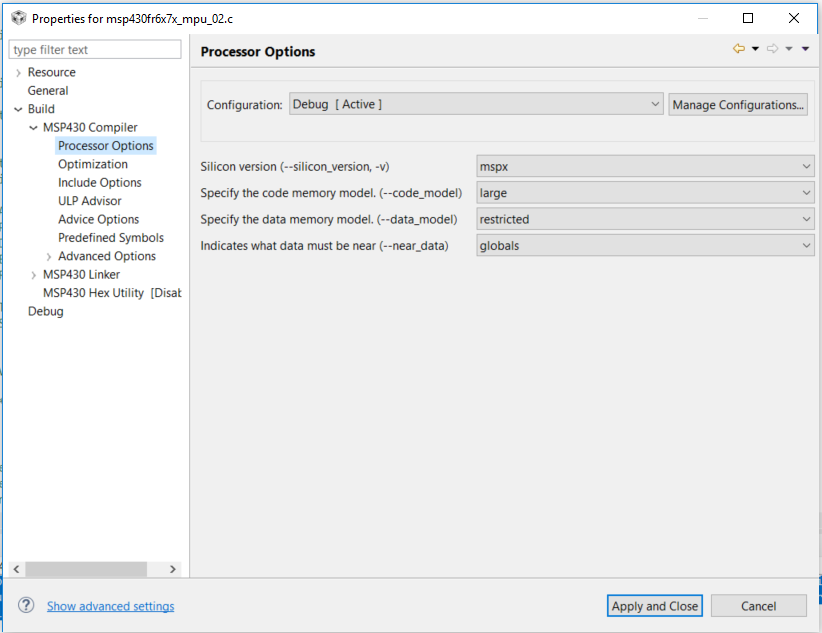Other Parts Discussed in Thread: MSP430WARE, MSP430FR6972, MSP-TS430PM64F, MSP-EXP430FR6989, MSP430FR5969
Tool/software: Code Composer Studio
Hi All!
1) Clear installation of CCS 8.1.0
2) create "simple main.c program:
#include <msp430.h>
/**
* main.c
*/
int main(void)
{
WDTCTL = WDTPW | WDTHOLD; // stop watchdog timer
return 0;
}
2) compile this : -vmsp --code_model=small --data_model=small -O4 --opt_for_speed=5 --use_hw_mpy=32 --include_path="C:/ti/ccs8/ccsv8/ccs_base/msp430/include" --include_path="C:/alex/ti/workspace_v8/ZU_v7_FR5972" --include_path="C:/ti/ccs8/ccsv8/tools/compiler/ti-cgt-msp430_18.1.3.LTS/include" --advice:power=all --advice:hw_config=all --define=__MSP430FR5972__ --define=_MPU_ENABLE --printf_support=minimal --diag_warning=225 --diag_wrap=off --display_error_number --silicon_errata=CPU21 --silicon_errata=CPU22 --silicon_errata=CPU40
linker flags: -vmsp --code_model=small --data_model=small -O4 --opt_for_speed=5 --use_hw_mpy=32 --advice:power=all --advice:hw_config=all --define=__MSP430FR5972__ --define=_MPU_ENABLE --printf_support=minimal --diag_warning=225 --diag_wrap=off --display_error_number --silicon_errata=CPU21 --silicon_errata=CPU22 --silicon_errata=CPU40 -z -m"ZU_v7_FR5972.map" --heap_size=160 --stack_size=160 --cinit_hold_wdt=on -i"C:/ti/ccs8/ccsv8/ccs_base/msp430/include" -i"C:/ti/ccs8/ccsv8/ccs_base/msp430/lib/5xx_6xx_FRxx" -i"C:/ti/ccs8/ccsv8/ccs_base/msp430/lib/FR59xx" -i"C:/ti/ccs8/ccsv8/tools/compiler/ti-cgt-msp430_18.1.3.LTS/lib" -i"C:/ti/ccs8/ccsv8/tools/compiler/ti-cgt-msp430_18.1.3.LTS/include" --priority --reread_libs --define=_MPU_ENABLE --diag_wrap=off --display_error_number --warn_sections --xml_link_info="ZU_v7_FR5972_linkInfo.xml" --use_hw_mpy=F5 --rom_model
Result - 7 errors
**** Build of configuration Release for project ZU_v7_FR5972 **** "C:\\ti\\ccs8\\ccsv8\\utils\\bin\\gmake" -k -j 8 all -O Building file: "../main.c" Invoking: MSP430 Compiler "C:/ti/ccs8/ccsv8/tools/compiler/ti-cgt-msp430_18.1.3.LTS/bin/cl430" -vmsp --code_model=small --data_model=small -O4 --opt_for_speed=5 --use_hw_mpy=32 --include_path="C:/ti/ccs8/ccsv8/ccs_base/msp430/include" --include_path="C:/alex/ti/workspace_v8/ZU_v7_FR5972" --include_path="C:/ti/ccs8/ccsv8/tools/compiler/ti-cgt-msp430_18.1.3.LTS/include" --advice:power=all --advice:hw_config=all --define=__MSP430FR5972__ --define=_MPU_ENABLE --printf_support=minimal --diag_warning=225 --diag_wrap=off --display_error_number --silicon_errata=CPU21 --silicon_errata=CPU22 --silicon_errata=CPU40 --preproc_with_compile --preproc_dependency="main.d_raw" "../main.c" Finished building: "../main.c" Building target: "ZU_v7_FR5972.out" Invoking: MSP430 Linker "C:/ti/ccs8/ccsv8/tools/compiler/ti-cgt-msp430_18.1.3.LTS/bin/cl430" -vmsp --code_model=small --data_model=small -O4 --opt_for_speed=5 --use_hw_mpy=32 --advice:power=all --advice:hw_config=all --define=__MSP430FR5972__ --define=_MPU_ENABLE --printf_support=minimal --diag_warning=225 --diag_wrap=off --display_error_number --silicon_errata=CPU21 --silicon_errata=CPU22 --silicon_errata=CPU40 -z -m"ZU_v7_FR5972.map" --heap_size=160 --stack_size=160 --cinit_hold_wdt=on -i"C:/ti/ccs8/ccsv8/ccs_base/msp430/include" -i"C:/ti/ccs8/ccsv8/ccs_base/msp430/lib/5xx_6xx_FRxx" -i"C:/ti/ccs8/ccsv8/ccs_base/msp430/lib/FR59xx" -i"C:/ti/ccs8/ccsv8/tools/compiler/ti-cgt-msp430_18.1.3.LTS/lib" -i"C:/ti/ccs8/ccsv8/tools/compiler/ti-cgt-msp430_18.1.3.LTS/include" --priority --reread_libs --define=_MPU_ENABLE --diag_wrap=off --display_error_number --warn_sections --xml_link_info="ZU_v7_FR5972_linkInfo.xml" --use_hw_mpy=F5 --rom_model -o "ZU_v7_FR5972.out" "./main.obj" "../lnk_msp430fr5972.cmd" -llibmpu_init.a -llibmath.a -llibc.a <Linking> >> WARNING: --use_hw_mpy compiler setting (32) does not match linker setting (F5). Both options will be set to compiler setting. warning #10204-D: could not resolve index library "libmpu_init.a" to a compatible library warning #10204-D: could not resolve index library "libmath.a" to a compatible library warning #10420-D: For FRAM devices, at start up, the GPIO power-on default high-impedance mode needs to be disabled to activate previously configured port settings. This can be done by clearing the LOCKLPM5 bit in PM5CTL0 register. remark #10371-D: (ULP 1.1) Detected no uses of low power mode state changing instructions remark #10372-D: (ULP 4.1) Detected uninitialized Port A in this project. Recommend initializing all unused ports to eliminate wasted current consumption on unused pins. remark #10372-D: (ULP 4.1) Detected uninitialized Port B in this project. Recommend initializing all unused ports to eliminate wasted current consumption on unused pins. remark #10372-D: (ULP 4.1) Detected uninitialized Port C in this project. Recommend initializing all unused ports to eliminate wasted current consumption on unused pins. remark #10372-D: (ULP 4.1) Detected uninitialized Port D in this project. Recommend initializing all unused ports to eliminate wasted current consumption on unused pins. remark #10372-D: (ULP 4.1) Detected uninitialized Port E in this project. Recommend initializing all unused ports to eliminate wasted current consumption on unused pins. >> Compilation failure makefile:143: recipe for target 'ZU_v7_FR5972.out' failed undefined first referenced symbol in file --------- ---------------- MPUSEG <whole-program> __mpusam <whole-program> __mpuseg <whole-program> error #10234-D: unresolved symbols remain error #10010: errors encountered during linking; "ZU_v7_FR5972.out" not built gmake[1]: *** [ZU_v7_FR5972.out] Error 1 gmake: *** [all] Error 2 makefile:139: recipe for target 'all' failed **** Build Finished ****
Thereis my mistake ?






